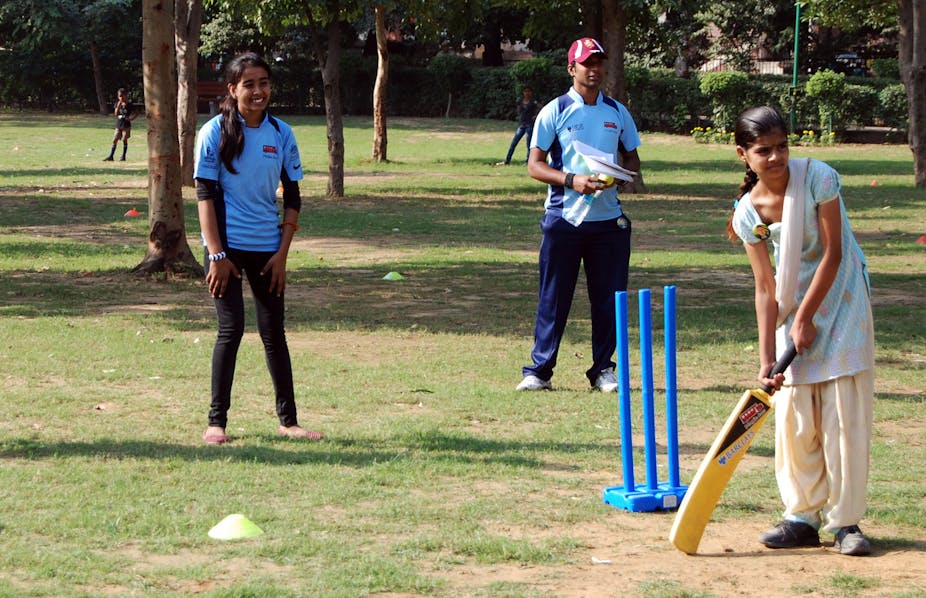Australian prime minister Tony Abbott will visit India this week, his first trip to the country since Narendra Modi took office. On the agenda will be a range of issues important to India and Australia, including the economy, nuclear energy, defence and their “strategic partnership”.
The India-Australia relationship has moved well beyond a mutual fondness for cricket. Freed from the ideological baggage of Cold War politics, India’s rising economic profile and two-way trade opportunities, the large Indian diaspora in Australia and India’s rising military strength and growing naval presence have facilitated the convergence of interests of the two biggest naval powers in the Indian Ocean region.
It’s money that matters
Recent years have seen remarkable growth in the trading relationship between India and Australia. A decade ago, India wasn’t in the top ten destinations for Australian exports. Today India is Australia’s fifth-largest export partner. India accounts for $A11.4 billion or 3.6% of Australian exports.
India is not only a trade destination for Australia, but it is also a source of investment in Australia – which has reached $11 billion. Indian companies such as Tata Consultancy, Infosys, Mahindra Aerospace and Adani’s mining venture have made significant investments in the Australian economy. Two-way trade has grown in value from A$5.1 billion in 2003 to A$15.2 billion in 2013.
Abbott’s visit will address the ongoing Australia-India Comprehensive Economic Cooperation Agreement negotiations. According to a 2008 feasibility study, the agreement, if it had been adopted then, would have yielded a gain to Australia of $43 billion over the period 2010-20 (in 2008 net present value terms) and a gain to India’s real GDP of $46 billion.
Once materialised, the free-trade agreement would broaden the base of merchandise trade and encourage two-way trade by lowering tariff barriers, bringing regulatory transparency, reducing border restrictions on trade in goods and services and enhancing investment protections. The surging Indian economy has an immense appetite for resources. Australia can fill this gap.
The sale of uranium: on the top of the agenda
As widely speculated, the Abbott-Modi meeting is likely to seal the deal on negotiations for exporting uranium to India, which began under the Gillard Labor government.
Reportedly, Indian officials have assured and convinced Australian officials that the uranium from Australia will be used only for civilian purposes. India’s energy mix contains 3-4% of nuclear energy. Nuclear energy could constitute around 20-25% of Indian energy by 2050.
Thus this is a big market for Australia to tap. Australia has 40% of the world’s uranium reserves and the sale of uranium will not only help India’s energy security efforts, but will also strengthen the trust between the two countries.
Defence and security issues
The Modi-Abbott meeting will take further steps to bolster defence and security co-operation. There has been a convergence of views between the nations on traditional and non-traditional security threats, including protecting the global commons and the sea lanes of communication and preventing the spread of illiberal democracies and Islamic terrorism.
Since the unfolding of a quadrilateral initiative followed by a naval exercise in the Bay of Bengal in 2007, Australia and India’s defence forces – particularly their naval forces – have increased the level of interactions.
In November 2009, then-Australian prime minister Kevin Rudd and his Indian counterpart Manmohan Singh issued a joint statement on an agreement to upgrade bilateral relations to the level of a “strategic partnership”. This was followed by a Joint Declaration on Security Cooperation aimed at streamlining their joint efforts to maintain peace, stability and prosperity through closer cooperation on security challenges in the Asia-Pacific region.
Two pragmatic leaders
Abbott was one of the first world leaders to contact Modi upon Modi’s victory, inviting him to Australia for the G20 Leaders’ Summit and a bilateral visit. Modi was invited to Australia in 2002 under its Special Visitors Program as a potential leader. Foreign minister Julie Bishop noted he was “one to watch”.
Modi’s policy initiatives, both on the domestic and foreign policy front, are business-friendly and pragmatic. This augurs well for India-Australia relations on economic and strategic fronts.
Abbott and Modi are both realistic and action-oriented, and committed to ambitious infrastructure developmental programmes. Their upcoming meeting should be a further step in cementing the strategic partnership.

